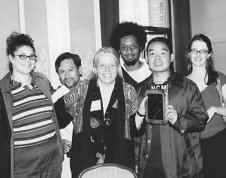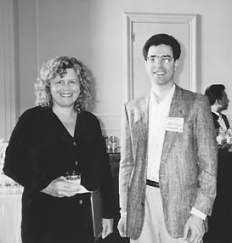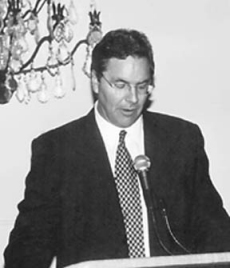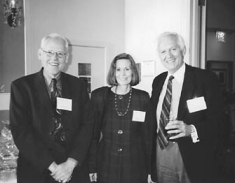Released: October 01, 2001

2001 CA News : 30th Anniversary Issue
Table of Contents
- 30th anniversary fundraiser sets new record at $39,000
- CA takes action to block AT&T arbitration clause
- CA receives a national award for consumer education
- Teaming with Capital One to promote financial literacy
- Free multilingual publications take aim at financial fraud
- Protecting children from preventable disease
- New at Consumer Action
- Thanks to all of CA's donors and educational partners!
30th anniversary fundraiser sets new record at $39,000
Consumer Action celebrated its 30th birthday with a gala party on June 21. The annual fundraising event set a new record, bringing in a bit over $39,000 in donations from individuals, community organizations and corporations. The funds will help support CA's multilingual consumer hotline and the publishing of Consumer Action News in print and on the Internet.
One hundred guests gathered at San Francisco's Marines Memorial Club to celebrate CA's effective brand of education and advocacy and to participate in the presentation of its Consumer Excellence Awards. Every year, CA chooses an awardee from each of three categories: media, lawmakers and community- based organizations.
The 2001 awardees were:
- New California Media, a network of print, broadcast and online ethnic news organizations founded in 1996 by the non-profit Pacific News Service. In presenting the award, Linda Sherry, CA editorial director, lauded the group for promoting the concerns of California's ethnic communities and disseminating important news, alerts and information to non-English-speaking residents.
- The Hon. Kevin Shelley, majority leader of the California Assembly, was honored for his commitment to consumer issues since his election to the Assembly in 1996. Rosemary Shahan, president of Consumers for Auto Reliability and Safety, presented the award, noting that Shelley has authored legislation to curb reckless use of handguns, safeguard children from lead exposure in public schools and protect California consumers from unscrupulous car dealers. He also played a major role in significantly expanding consumer protections under California's Lemon Law, which protects buyers of flawed vehicles, to include vehicles owned by small businesses.
- The Consumer Law Project of Public Counsel. CA Consumer Advocate Guadalupe Aguilar presented the award, highlighting the Los Angeles-based project's commitment to helping low income consumers obtain legal services. The volunteer lawyers represent people who have fallen prey to a variety of scams and legal woes, including home equity fraud, unscrupulous home improvement contractors and deceptive private trade schools.
Ken McEldowney, CA's executive director, thanked the donors and the group's educational partners for their support. "It is organizations, individuals and corporations such as these that help us keep our vital multilingual consumer services alive."
McEldowney also gave special recognition to CA's "Inner Circle" of companies that donated a minimum of $2,500. (See Thanks to all of CA's donors and educational partners!)
| Pictures of the 30th Anniversary Party | |
|---|---|
 Employees of Pacific News Service and YO showed up to accept a Consumer Excellence Award on behalf of sister organization New California Media. From left: Allegra Harrison, Julian Do, Sandy Close, Kevin Weston, Andrew Lam and Tricia Johnson. (Photo by Linda Sherry) |

CA's Linda Sherry with Rich Sayers, founder of 10-10 PhoneRates.com. (Photo by Sarah Hinds) |

The Hon. Kevin Shelley, majority leader of the California Assembly, accepts CA's 2001 Consumer Excellence Award. (Photo by Linda Sherry) |

From left: CA Executive Director Ken McEldowney, Rosemary Shahan of Consumers for Auto Reliability and Safety, and Richard Elbrecht of the California Department of Consumer Affairs. (Photo by Sarah Hinds) |
CA takes action to block AT&T arbitration clause
By Sarah Hinds
Earlier this year, AT&T sent its customers a notice prompted by a recent federal rule change allowing phone companies to stop filing tariffs with the Federal Communications Commission (FCC).
But buried in the notice is a new and unrelated policy: a clause that requires consumers to settle any dis-putes with AT&T through "mandatory, binding and secret" arbitration or in small claims court.
By simply continuing to use and pay for their AT&T long distance service, consumers are unknowingly surrendering their right to a court trial.
Charging that the notice is unfair and deceptive, Consumer Action (CA) filed suit in July against AT&T in California Superior Court in Alameda County. The case was removed to federal court on Aug. 1.
Filed by CA and lead plaintiff Darcy Ting of Berkeley, CA, the case alleges that AT&T's mandatory arbitration provision violates California's Consumer Legal Remedies Act and the Unfair Business Practices Act. Legal representation is by the Trial Lawyers for Public Justice (TLPJ), a national public interest law firm based in Washington, DC, and the Sturdevant Law Firm of San Francisco.
According to F. Paul Bland, Jr. of TLPJ, a federal magistrate judge in San Francisco on Aug. 24 stated on the record that CA's case would "probably succeed on the merits of at least some of its claims."
Bland, author of a new manual for consumer attorneys on how to fight forced arbitration, reported that the judge said he was troubled by several aspects of the arbitration clause, including: limitations on the damages won by consumers; financial obstacles placed on consumers who wish to pursue claims, and a sweeping secrecy provision barring customers from publicly discussing their claims.
Bland noted that after reviewing the evidence the judge said it was not clear if a consumer can vindicate her or his rights under AT&T's mandatory arbitration clause. A trial is scheduled for Nov. 5 in the Northern District of California.
Ken McEldowney, CA's executive director, expressed concern that many AT&T consumers do not know the import of what they are agreeing to by simply continuing to use AT&T.
"This notice is full of fine print and legalese that almost guarantees it won't be read or understood," he said. "Little do customers know that they are giving up a fundamental right to settle disputes in a court of law."
The complaint alleges that AT&T's arbitration clause is unfairly broad. Not only are customers denied access to the court system, but it calls for a two-year statute of limitations on claims against the company. The lawyers note that almost all other California consumer protection laws give consumers three to four years to file a claim.
The plaintiffs object to AT&T's attempt to keep the arbitration process secret, instead of open to public scrutiny as most court cases are. This would make it difficult, if not impossible, for consumers and advocacy groups to monitor the fairness of the arbitration process.
AT&T's policy requires that all arbitrators be from the American Arbitration Association (AAA), a large group that works for many corporations. Because of its business relationship with AT&T, critics charge that AAA will not retain the objectivity of the public justice system and may be biased on behalf of its large corporate clients who provide the association's livelihood.
"Customers must be able to hold this telecommunications giant accountable in court," said co-lead counsel James C. Sturdevant of the Sturdevant Law Firm.
Sturdevant said that all AT&T long distance customers automatically are plaintiffs in the action.
CA receives a national award for consumer education
An educational outreach program centered on a free Medicare guide created by Consumer Action for seniors and the disabled received the 2001 Excellence in Consumer Education Award from the National Association of Consumer Agency Administrators (NACAA) at its annual conference in St. Petersburg, FL, on June 29.
"It's Your Choice," written by Linda Sherry, CA's editorial director, provides information about the Medicare initiative Medicare+Choice, and includes sections on Medicare health maintenance organizations (HMOs), options for coverage and beneficiaries' rights. The 27-page publication was created in partnership with PacifiCare Health Systems, the National Consumer League and the Gray Panthers.
Sherry said that "It's Your Choice" was written to help seniors and the disabled learn more about changes in the Medicare system stemming from the 1997 Balanced Budget Act.
"That legislation created a lot of complex and confusing changes to Medicare," she said. "The official government publications are hard for the average reader to understand and we felt it would be too easy for beneficiaries to misunderstand coverage choices and overlook key federal rights."
Ben Singer, vice president, corporate public relations for PacifiCare, said the partnership with CA helped to bring an important message about Medicare changes to individuals and populations that would not have been reached otherwise.
"Consumer Action is a great resource, and I'm pleased that our sponsorship helped educate consumers about changes in Medicare," said Singer.
Sherry said the partners believed that seniors were going to be confused by the new Medicare health coverage options. To determine the need for an educational campaign, a survey by Roper-Starch Research Worldwide Inc. was commissioned in early 1999.
The study asked 1,002 randomly selected Medicare beneficiaries between ages 65 and 85 how familiar and confident they were with Medicare+Choice coverage options, and found that:
- Only half of the seniors surveyed were aware that new Medicare health care coverage options were available to them as of Jan. 1, 1999.
- Two-thirds of the seniors surveyed (66%) were either somewhat unfamiliar or not at all familiar with the new Medicare coverage options.
- More than half of the seniors surveyed (53%) could not recall getting any information earlier in the year from the federal government on their new choices in Medicare.
The publication formed the basis of a two-year outreach program, concluded late last year. Among the highlights of the program:
- The partners unveiled a consumer opinion survey and the "It's Your Choice" guide at a press conference in Washington, DC. Sherry embarked on a national media tour, visiting New York City, NY; Fresno, Sacramento, San Diego, San Francisco, Los Angeles and Palm Springs, CA; St. Louis and Kansas City, MO; Colorado Springs and Denver, CO; Portland, OR; Seattle, WA; Tucson and Phoenix, AZ.
- Through its network of 6,500 community-based agencies nationwide, CA offered postage-paid free bulk copies of the publication. More than 195,000 copies were requested and mailed to organizations in 49 states and U.S. territories.
- A series of "It's Your Choice" town-hall meetings were held in Portland, OR; Las Vegas, NV; Denver, CO; Oklahoma City and Tulsa, OK and Dallas, Houston and San Antonio, TX, to help educate Medicare-eligible people and their relatives, friends or caregivers about Medicare benefits. The town hall meetings, publicized through local media outlets and senior publications, included doctors and other medical providers, representatives of local health care, consumer and senior groups and the Health Insurance and Counseling Assistance Program, a federally funded organization that counsels Medicare beneficiaries.
- Editorial opinion pieces about the need to educate and inform Medicare beneficiaries, written by Sherry and Ken McEldowney, CA executive director, ran in newspapers and senior publications nationwide.
- Letters were mailed to all members of the Congress, offering bulk copies of the guide for distribution to their constituents.
- Each copy of "It's Your Choice" contained a postage paid response card, asking readers to rate the information. The cards brought an overwhelmingly positive response, with more than 94 per cent of respondents agreeing that the guide gave them a better understanding of the benefits and coverage options available specifically through Medicare HMOs.
Asked if the guide helped them to understand the changes in Medicare and Medicare+Choice health plan options, 83 per cent agreed.
"It's Your Choice" can be found on CA's web site in English or Spanish.
Teaming with Capital One to promote financial literacy
Good credit, effective money management, basic banking skills and credit repair are the focus of a new one-year, multilingual financial literacy program created by Consumer Action (CA) in partnership with Capital One, a Virginia-based credit card issuer.
Each of the four topics will serve as a separate project. For each project, CA will create a consumer brochure, a leaders' training guide and a seminar lesson plan to serve as a blueprint for outreach and trainings by CA and Capital One. The company's staff will volunteer to conduct trainings at community groups in the company's home state, while CA staff will handle outreach in other parts of the country.
"Consumer credit card debt has gone up considerably since 1990, while consumer savings have dwindled," notes Mikael Wagner, a CA community advocate who will train Capital One volunteers to prepare them for the outreach in Virginia and conduct trainings for community-based organizations (CBOs) elsewhere. "People need to become more financially literate in order to provide for themselves, their families and their retirement," he said.
Each brochure will be produced in Chinese, English, Korean and Spanish. The partners expect to release the first of the four programs, "Building and Keeping Good Credit," in October.
Overall, the program will produce one million publications, to be distributed free and in bulk through CA's national network of 6,500 community-based organizations (CBOs). Individuals will be able to obtain the brochures by sending a self-addressed, stamped envelope to CA.
All of the materials will be available online at Consumer Action web site.
Diana Don, manager of media relations for Capital One, said that a deciding factor in creating the partnership with CA was its "established network of distribution, which means that this important information about financial literacy will reach consumers throughout the nation."
Free multilingual publications take aim at financial fraud
By Sarah Hinds
A new series of free, multilingual brochures to educate consumers about fighting fraud was released by Consumer Action (CA) in July. Funded by The San Francisco Foundation's Bank of America Consumer Education Fund (BACEF), the four educational publications cover credit repair scams, credit card fraud, home equity loan fraud and identity theft. They are available in Chinese, English, Korean, Spanish and Vietnamese:
- "Credit Repair Scams: They make your money disappear" addresses the risks involved when companies promise to repair your credit or guarantee you credit. (Available online in English or Spanish.)
- "Preventing Credit Card Fraud: Learn how to protect yourself" provides information about how to keep your credit card from being used by crooks. (Available online in English or Spanish.)
- "Don't Lose Your Home! How to avoid home equity loan fraud" explains how home equity loan fraud works and why certain high rate loans are illegal, and offers tips on how to avoid losing your home to this crime. (Available online in English or Spanish.)
- "Protect Yourself From Identity Theft: It's your good name" describes how impostors steal other people's personal information-usually Social Security numbers-and use it to obtain credit cards and loans, open utility accounts and rent apartments. (Available online in English or Spanish.)
"Providing multilingual educational materials is key, since non-English-speakers are often targeted by scams such as home equity loan fraud," said Kathy Li of CA's resource center.
A series on basic banking will be released this fall.
The publications are available for free and in bulk to non-profit community-based organizations. In July CA mailed order forms to its national network of 6,500 groups and has received requests for more than 300,000 copies.
Single free copies are available to individuals who send a self-addressed, stamped envelope with their request to CA's San Francisco office. (For more information, see the How to Order page.)
Protecting children from preventable disease
By Martha Hannan and Neil Gendel
In its first ten years, The Healthy Children Organizing Project (HCOP), a project of Consumer Action, has created a nationally recognized collaborative model for working with lower income communities to prevent childhood lead poisoning. Now we are expanding those successful efforts to include four other preventable diseases and conditions: asthma, malnutrition, dental caries and lack of immunizations.
Many childhood illnesses are caused by environmental hazards in children's homes and elsewhere. In San Francisco, a study of children attending six public elementary schools in the low income neighborhood of Bayview-Hunter's Point found that 18% have asthma, and this percentage is rising-asthma cases have grown 160% in recent years. Lead poisoning continues to be a cause of great con-cern to children's health advocates. In San Francisco's lower income neighborhoods, 10-20% of one- and two-year-olds tested had elevated levels of lead in their blood. Despite these statistics, prevention continues to be a low priority for the Department of Public Health and health care providers.
Established in 1991, HCOP's mission is to protect children from preventable diseases and conditions in San Francisco's low income communities of color. Our unique, long-term approach to promoting children's health has had a strong record of success and has gained widespread support. HCOP promotes prevention by:
- Building the capacity of communities to educate themselves about health issues.
- Urging city agencies to educate parents about protecting children from environmental hazards, and to make public facilities healthy for young children.
- Organizing and facilitating efforts to create healthy homes for children.
HCOP facilitates the work of the San Francisco Healthy Children Community Collaboration, a network of organizations providing training and follow-up in low income communities to prevent childhood diseases and unhealthy conditions. The collaboration is a rich mix of organizations representing many different geographic, ethnic and service communities:
- Wu Yee Children's Services and Children's Council from the child care resource and referral community.
- St Peter's Housing Committee, a tenants' rights advocacy group.
- Bernal Heights Neighborhood Center.
- Asian Pacific Islander Family Resource Network (APIFRN), a collaboration of 27 groups serving parents and their children in many Asian communities throughout the city.
- The San Francisco League of Urban Gardeners, which promotes soil cleanup through community organizing.
- Literacy for Environmental Justice, which engages youth in community education and advocacy efforts on environmental justice issues.
HCOP and the collaboration are also involved in advocating for healthy homes and city facilities, primarily through the Lead Poisoning Prevention Citizen's Advisory Committee (LPPCAC). We monitor the efforts of government agencies, including the departments of public health, recreation and parks and human services, the library, the school district and the housing authority, to help educate parents and make public facilities healthy for children.
Last year the school district issued its first ever "lead in paint" report, finding lead hazards in 50 of 92 elementary school and child development sites for children ages three and four. A remediation program is in progress. The library has renewed efforts to provide educational materials to parents at neighborhood branches. The recreation and parks department continues to remove lead hazards in its over 200 sites, many of which are used by small children. The public health department is working with the LPPCAC to improve the blood lead testing rates of small children in publicly funded programs. City building inspectors continue to monitor compliance with a recent law that requires lead-safe work practices on building exteriors.
HCOP leads efforts to enact legislation to make homes lead safe. Neil Gendel, HCOP's director, has been the chair of San Francisco's Lead Hazard Reduction Citizens Advisory Committee since its inception in 1993. Several pieces of important legislation have been passed because of that committee's recommendations, including mandatory use of safe work practices when disturbing lead paint on the exteriors of buildings.
In addition, in June the Board of Supervisors recommended revisions to public nuisance legislation that is backed by HCOP and other organizations. They will add mold, mildew and lead hazards in people's homes to the list of public nuisances and require clean up by landlords. This is a big step forward in the struggle to ensure that every child in San Francisco has the opportunity to live, learn and play in healthy homes.
Our vision is broad, but no one strategy is going to result in the changes needed for all children to be healthy. Everyone who touches the lives of children and their parents must contribute. We're glad to report progress, but successes don't come quickly or easily and there is still much more to be done.
Martha Hannan is associate director of the Health Children Organizing Project. Neil Gendel is its director.

The Healthy Children Organizing Project staff, from left: Zoe Rossing, program assistant; Neil Gendel, director; Martha Hannan, associate director. (Photo by Hazel Kong)
New at Consumer Action
In recent months, Consumer Action (CA) hired a new staff member to assist the Healthy Children Organizing Project. In addition, a new office manager was promoted from the ranks and several students joined the staff temporarily over the summer.
Hazel Kong was promoted to office manager in San Francisco. Kong has been with CA since April 1999, working in administration and as the Cantonese hotline counselor. She previously worked at a legal services firm. Staff members are so smitten with Kong's baby daughter Ivy that her picture adorns bulletin boards throughout the office.
Zoe Rossing joined the staff in July as program assistant in CA's Healthy Children Organizing Project (HCOP). Rossing most recently worked at an Internet company in Boston, MA, that provided children's health information. She also worked in Boston as a reporter for Spare Change, an advocacy paper distributed by the homeless. She finds her new job "a great place to learn more about the urban environmental issues impacting children's health."
Student interns helped with a variety of tasks around the office this summer, including archiving publications, updating CA's news clipping file, packing and shipping publication orders, answering phones and entering data.
Anjuli Lam and Anna Lee, freshmen at George Washington High School in San Francisco, came to CA through the Mayor's Youth Employment and Education Program (MYEEP).
Anna Tran, the sister of a former CA student intern, is also a freshman at George Washington.
Mary Tam was employed at CA through the School-to-Career Partnership. A recent graduate of Galileo High School in San Francisco, Tam is beginning college in September at the University of California at Santa Cruz. Cui Yi Xie, a recent graduate of Balboa High School, will be attending UC Berkeley this fall.
Two former interns are now part-time support staff members. They are Cui Yan Xie, sister of intern Cui Yi, and Vicky Zeng. They attend City College in San Francisco.

Student interns Anjuli Lam (left) and Anna Lee helped out at CA this summer. (Photo by Hazel Kong)
Thanks to all of CA's donors and educational partners!
Inner Circle
Bank of America
Capital One Financial Services
Paul Fadelli, California Cable Television Association
Pacific Bell
Providian Financial
SBC Communications Inc.
Verizon
Washington Mutual
Corporate Benefactor
American Express Company
AOL Time Warner
AT&T
Chavez & Gertler, LLP
Edison Electric Institute
PacifiCare Health Systems
Sprint
Corporate Sponsor
MasterCard International
Corporate Friend
Trish Butler, Sage Communications
California State Automobile Association (CSAA)
Consumer Attorneys of California
California Payphone Association
Jim Conran, Consumers First, LLC
Experian Inc.
Samuel A. Simon, Issue Dynamics, Inc.
Sturdevant Law Firm
Golden Circle
Zelda R. Heffer
Silver Circle
Judith R. Rosenberg
Individual/Community Benefactor
Alonzo Printing
Ronald and Nancy Blackman
William Kent Brunette, Usable News Productions
Marsha Cohen
Eugene Coleman
Consumers Union
Walter McEldowney
Steven Solomon, Law Offices of Steven Solomon
Leslie Summers, ValueStar
Individual/Community Sponsor
Chris Bjorklund
Molly Hopp
Thomas Jenkins, Jenkins & Mulligan
Daniel Mulligan, Jenkins & Mulligan
Individual/Community Friend
Candace Acevedo
California Service Station and Auto Repair Association
Sailaja Cherukuri, California Dept. of Consumer Affairs
Peter Cheung, Amervest Company
Gerri Detweiler
Richard Elbrecht, California Dept. of Consumer Affairs
Jennifer Cross and Ellis Gans
John Geesman
Pastor Herrera, Jr.
Sue Hestor
Martin Mattes, Esq.
National Home Equity Mortgage Association
Helen Nelson, Consumer Research Foundation
Kay Pachtner
Louise H. Renne, S.F. City Attorney
Richard C. Sayers
Sherman Tung, Time Advertising, Inc.
2001 Educational Partners
AARP
American Express
AT&T
Bank of America Consumer Education Fund
California Consumer Protection Foundation
California Credit Union League
The California Endowment
California Public Utilities Commission
California State Automobile Association
Capital One Financial Services
Consumer Credit Counseling Services, San Francisco
Consumer Federation of America
Consumer Literacy Consortium
Consumers First
Earle Palmer Brown
Edison Electric Institute
The Federal Reserve Board
The Gas Company
The Fred Gellert Family Foundation
Gray Panthers
The Miriam and Peter Haas Fund
Hager Sharp
The Hastings Group
The Home Depot
National Consumers League
The National Foundation for Consumer Credit
The Neighborhood Reinvestment Corporation
Pacific Bell
PacifiCare
Providian Financial
The San Francisco Foundation
SBC
The U.S. Cooperative State Research, Education and Extension Service
U.S. Department of Housing and Urban Development (HUD)
U.S. Department of the Treasury
And...Our National Network of 6,500 Community-based Agencies



